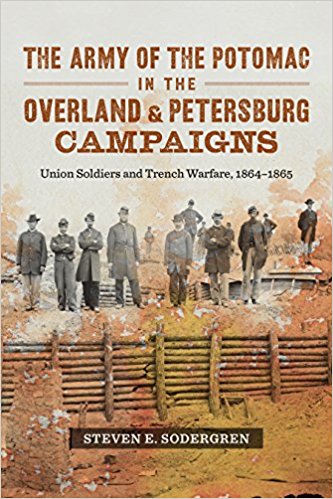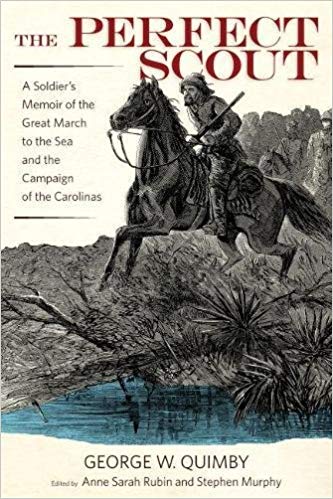The Army of the Potomac in the Overland and Petersburg Campaigns by Steven E. Sodergren. Louisiana State Press, 2017. Cloth, ISBN: 978-0807165560. $47.95.
 In 1998, J. Tracy Power published Lee’s Miserables, a groundbreaking analysis of the demoralization of common soldiers in the Army of Northern Virginia and the collapse of the Confederacy in the Civil War’s final year. By only covering the southern experience, however, Power raised a lingering question: how did soldiers in the Army of the Potomac manage those same campaigns differently and thereby avoid deterioration? Historian Steven E. Sodergren has finally delivered an answer with in his book The Army of the Potomac in the Overland and Petersburg Campaigns: Union Soldiers and Trench Warfare, 1864-1865. Brutalized by the destruction of the Overland Campaign, Sodergren finds that the soldiers in the Army of the Potomac welcomed the change of pace afforded by the Petersburg trenches. Petersburg supplied the major eastern fighting force with what it needed to persist, and with the strength required for its final push to Appomattox.
In 1998, J. Tracy Power published Lee’s Miserables, a groundbreaking analysis of the demoralization of common soldiers in the Army of Northern Virginia and the collapse of the Confederacy in the Civil War’s final year. By only covering the southern experience, however, Power raised a lingering question: how did soldiers in the Army of the Potomac manage those same campaigns differently and thereby avoid deterioration? Historian Steven E. Sodergren has finally delivered an answer with in his book The Army of the Potomac in the Overland and Petersburg Campaigns: Union Soldiers and Trench Warfare, 1864-1865. Brutalized by the destruction of the Overland Campaign, Sodergren finds that the soldiers in the Army of the Potomac welcomed the change of pace afforded by the Petersburg trenches. Petersburg supplied the major eastern fighting force with what it needed to persist, and with the strength required for its final push to Appomattox.
The Overland Campaign introduced many Union soldiers to continuous warfare. Scorched by the sun during daily battles, fatigued at night from constant marching, and malnourished due to flagging supplies, soldiers in the Overland Campaign struggled to adapt to the war’s new tempo and find the incentive to fight. These persistent worries, augmented by the constant threat of death, had “entirely drained away” the zeal and energy of the ranks by the end of the six-week campaign. Thus, while not pleased by the prospect of prolonged trench warfare, the ability to recoup behind the lines proved vital to preserving the Army of the Potomac as an effective fighting unit.
Largely desensitized, the Army of the Potomac settled apathetically into the nine, grinding months of the Petersburg campaign, their days now filled with the sounds of shovels and spades as impressive fortifications rose around them. Secure from the onslaught of charging enemy works, Sodergren argues that the soldiers regained a spirit of independence and “even enthusiasm for the future.” Static trench warfare was not without its own problems (especially due to the degrading conditions of the environment around them), but it also restored sense of relief. Replenished supplies, something virtually unknown during Overland Campaign’s constant forward movements and assaults, considerably improved living standards, permitting the army to maintain stable rations, medical supplies, and resources. Frequent mail deliveries, steady rotation patterns, and access to furlough opportunities offered healthy distractions from the monotony of trench life, a chance to reconnect with loved ones on the home front, and renewed one’s willingness to fight.
Hope of triumph, perhaps more so than anything, reinvigorated the forces of the Army of the Potomac. A stunning succession of Union victories during the latter half of 1864, culminating with Lincoln’s reelection, suggested that the war’s conclusion was drawing nearer, if only the Union could remain strong. The prevalent signs of the Confederate downfall engendered optimism, especially as deserters seeking refuge began frequently crossing no-man’s land into Union territory. Therefore, when finally ordered to launch a traditional campaign again in the last week of the war, the Army of the Potomac did so with a tremendous lift to their morale, and with “recognition of the important role they were playing in the final act.”
Surveying the shared experiences of approximately one hundred and seventy men in the Army of the Potomac, Sodergren expertly blends military and social history to provide an informative and personalized account of the fiercest period of Civil War combat and the Union troops who endured it. The Army of the Potomac in the Overland and Petersburg Campaigns deserves a place on the bookshelves of Civil War historians or anyone interested in the experiences of soldiers at war.
Briana Weaver is an M.A. candidate in the Department of History at Sam Houston State University.
